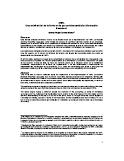XBRL Una redefinición de la forma en la que se intercambia la información financiera
Compartir este ítem
Fecha
2007Autor
Correa Molina, Andrés Felipe
Correa Molina, Andrés Felipe; Universidad de Medellín
Citación
Metadatos
Mostrar el registro completo del ítemResumen
Este artículo pretende reflexionar acerca de las implicaciones de la implementación del XBRL (eXtensible Business Reporting Language), como formato del proceso de reporting corporativo dentro de las empresas, partiendo de la situación actual de la contabilidad en términos de información, en la cual existen situaciones problemáticas en los medios que utilizan los contadores para reportarla al final de cada periodo, las cuales afectan su calidad y oportunidad, medida en términos de su utilidad, confiabilidad y de comparación. Los tradicionales momentos de lectura de información y reconstrucción manual para múltiples usuarios serán cosa del pasado, por lo menos en términos del alcance que tengan las taxonomías sobre las cuales se desarrollarán los elementos del XBRL. El artículo inicia, analizando el papel de la contabilidad en términos de la contabilidad del conocimiento y los retos que tiene la disciplina con relación al intercambio de la información y la efectiva comprensión por parte de los usuarios. Al final de este, se hace una reflexión acerca de la situación actual de la contabilidad colombiana, especialmente en términos de comunicación, y de las posibilidades e implicaciones de implementar las Tecnologías de la Información (TIC) como una herramienta que ayude a solucionar los problemas y obstáculos de la contabilidad colombiana para llegar a una contabilidad del conocimiento This article tries to make a reflection about the implications of the implementation of XBRL (eXtensible Business Reporting Language), as a format for corporative reporting process in the companies, starting with the present situation of accounting in information terms, which have important problems with the ways that the accountants use to report it at the end of every period, which affect their quality and opportunity, in terms of their utility, trustworthiness and comparison possibilities. The traditional moments of reading of information and manual reconstruction for users will be thing of the past, at least in terms of the reach that has the taxonomies on which they will develop the elements of XBRL. The article begins making a reflection around the character of the accounting, in terms of knowledge accounting and the challenges that the discipline has in relation to the interchange of the information and the effective understanding of the users. At the end of the article, there is a thought about the current situation of Colombian accounting, specially in terms of communication, and the possibilities and reach of taking TIC as a tool in order to solve the problems and obstacles for Colombian accounting in order to come into a knowledge accounting.
Colecciones
- General [207]

